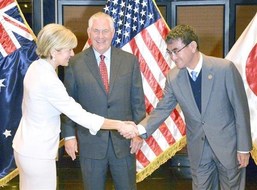 Source: www.japan-newsforest.com
Source: www.japan-newsforest.com The warning had the desired effect. In July of 2007 then Australian Defence Minister Brendan Nelson, on a visit to New Delhi immediately following one to Beijing, said during a press conference that Australia had no wish to enter into a quadrilateral dialogue and was satisfied with the trilateral arrangement that already existed between Australia, Japan, and the US. Following the removal of the Howard government and the accession of the Rudd government in November 2007, Australia became more reluctant to pursue any further discussion of a quadrilateral arrangement. In February 2008 this was spelled out in plain language by then Foreign Minister Stephen Smith during a visit to Australia by then Chinese Foreign Minister Yang Jiechi, thereby removing Australia from any further participation in the “quad”.
Yet a lot has changed over the course of 10 years. Australia has witnessed the growing infiltration of Chinese state owned enterprise and private investment into its private sector, its educational sector, and its political class. It has seen China seek influence in the Pacific through loans, thus turning Pacific Islands away from their traditional relationship with Australia, while Australia’s security and sovereignty has been threatened by cyber-based espionage launched from China. It has also seen China move to break up ASEAN by turning member states against one another, militarize the South China Sea to turn it into a Chinese controlled enclave, threaten an open border war with India, openly collaborate with Russia to oppose US and EU interests, and ignore international opinion and law in pursuit of unilateral goals.
It is not surprising, therefore, that Australia has voiced far more support for the idea of a “quad” in the past two weeks than in the past 10 years. In the age of uncertainty, or more accurately the age of Trump, Australia needs to ensure that it has the support of fellow democratic governments in the region so that its security won’t be compromised by being left alone to deal with China’s encroaching power.
Australia has always relied on having a major power to back up its security posture, and the combination of the US, Japan, and India as security partners would ensure that enough authority is there to cause China to pause before attempting to put pressure on Australia to adopt positions at odds with Australia’s interests (and/or its values). If a revived quadrilateral dialogue proves useful, this could then lead to other democracies, namely New Zealand and Singapore, wanting to join the framework, moves that Australia would definitely support and which would further strengthen the cause of democratic government in the region.
There will be those in the Australian community who will voice objections to any move to join the “quad”, but their views will not be those of the majority, particularly the majority in power. The real question though is whether the Australian Labor Party has moved on from its position in the late 2000s. Recent commentary from Opposition defence spokesman Richard Marles indicates that Labor has begun to appreciate that regional relations will be crucial to handling overall relations with China and that being involved in a dialogue with partners is preferable to being left outside this grouping and attempting to deal with China on our own. Opposition foreign affairs spokeswoman Penny Wong has also said words to this effect, although she has also said that China relations should not be seen through what she calls the “lens of risk management”. With the Labor left faction in the ascendancy on policy formulation, it will be interesting to see whether Labor does indeed agree to follow on with any quadrilateral dialogue with other regional democracies (albeit conservative democratic governments), or, in the event it wins the next federal election, it once again sees fit to pull Australia out of any such arrangement and thus leave Australia in a vulnerable position during the “age of uncertainty”.
 RSS Feed
RSS Feed